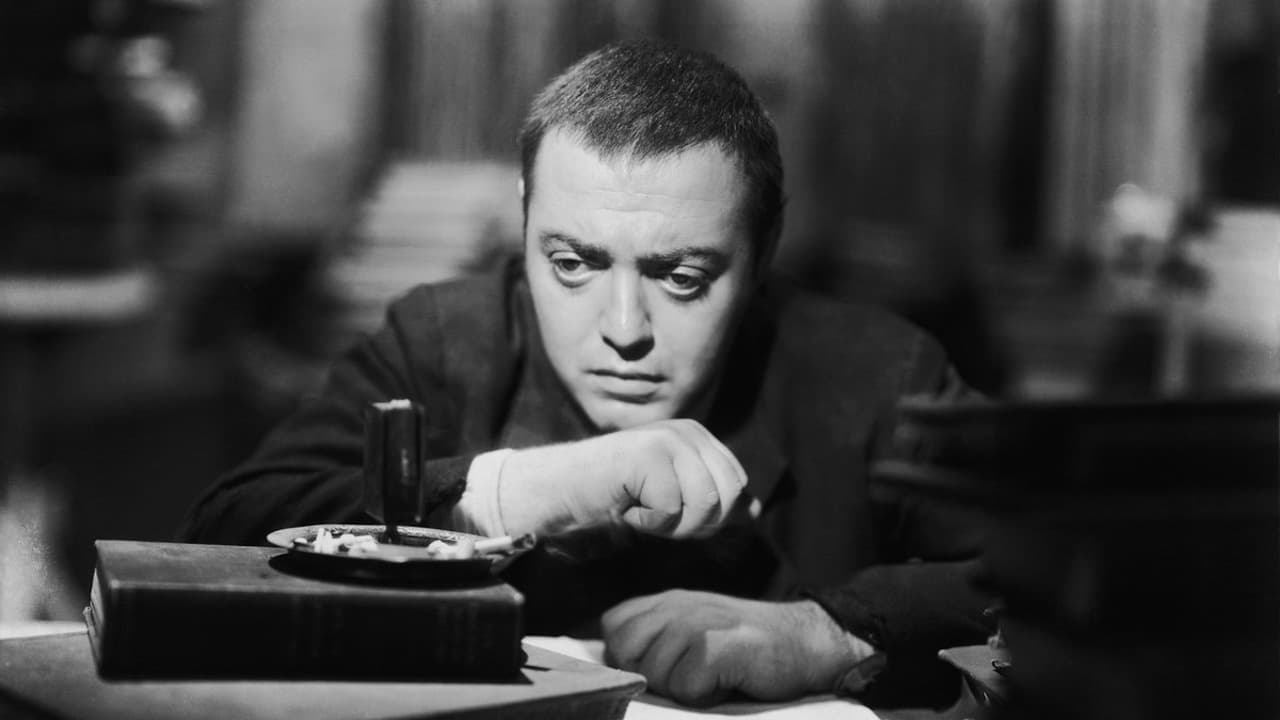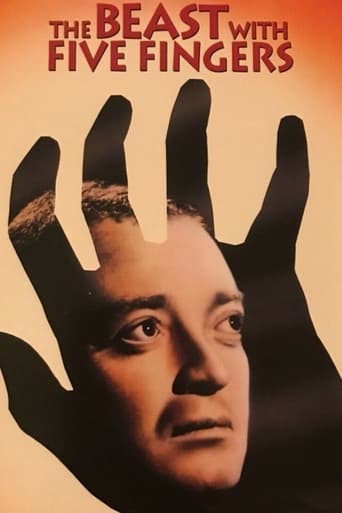

Self-important, over-dramatic, uninspired.
... View MoreBetter Late Then Never
... View MoreA bit overrated, but still an amazing film
... View MoreThis is a tender, generous movie that likes its characters and presents them as real people, full of flaws and strengths.
... View MoreFrancis Ingram (Victor Francen) hasn't let being paralyzed on his right side bring him down. In fact he's mastered playing the piano. He lives in a traditional spooky old mansion with two people devoted to him: his secretary Hilary Cummins (Peter Lorre), and his nursemaid / companion Julie Holden (Andrea King). He conveniently takes a fatal tumble down some stairs not long after crafting a new will and testament. A police commissioner (J. Carrol Naish) is not so certain that it was accidental, and begins to work his way through the assortment of possible suspects.The title makes you think that you're going to be in for some utter schlock, but it's misleading. This is really a pretty conventional "old dark house" type of period melodrama, taking place in an Italian village around the turn of the century. Much of the plot centers around the will, with horror elements fairly limited in this "what is illusion and what is reality" tale, scripted by Curt Siodmak. That said, director Robert Florey is very good at telling the story, creating the atmosphere, and getting excellent performances out of his well chosen cast. Certainly the horror highlights deal with Lorre, whose character is obsessed with astrology, and his confrontations with the disembodied hand of Ingram. This body part keeps dogging him, even when he's seemingly pinned it in place with a hammer and nail.Lorre is well worth watching; in fact, he's the *main* reason to watch, as he was in so many things. But everybody on screen is engaging, including leading man Robert Alda, whose character manages to be rather likable even though he's kind of a sleazy guy. Francen is memorable in his brief amount of screen time, and Naish is likewise a great deal of fun. The latter injects much humor into the goings-on with his performance, and even gets to break the fourth wall at the end.This is entertaining material through and through, provided one knows what to expect. The 1981 Michael Caine thriller "The Hand" is actually somewhat comparable.Seven out of 10.
... View MoreApart from its title, its setting in the library and two or three incidents (the servants quitting, the hand being locked in the safe), the movie, "The Beast With Five Fingers" bears very little relationship to the Harvey story. If anything, the screenplay tells a more spine-chilling tale, and tells it more effectively. In fact, Peter Lorre contributes one of his most dramatically macabre portraits. He receives great support from Victor Francen's chilling study of an eccentric pianist. Some memorable bits from Pedro De Cordoba's surly innkeeper and David Hoffman's slimy lawyer also add to the atmosphere. On the other hand, after his promising opening scene, Robert Alda slips into the hackneyed emotions of a conventional hero. As for Andrea King, whilst she certainly makes an attractive heroine, her acting is not altogether convincing. And then there's J. Carroll Naish who seemingly can't make up his mind whether to play his role for chills or misplaced humor!Fortunately, while he has obviously concentrated less on his players, director Florey has brought the film in with a fair amount of visual style. In fact, in at least two or three instances, Florey's direction is so compellingly inventive, it's impossible to take your eyes from the screen. McGann's masterly special effects are also compellingly realistic, while ever-reliable Max Steiner has contributed a music score as moodily atmospheric as his "Most Dangerous Game" or "King Kong".
... View MoreI would recommend this film for the performances of the leads more than anything. Peter Lorre, Robert Alda and Andrea King all did very well with their parts. Lorre, as Hilary (personal assistant to disabled but famed pianist Francis Ingram, played by Victor Francen), was really tailor made for this type of film, playing a suspicious and even somewhat creepy character. Alda (as a sort of con artist named Conrad Ryder, whose relationship with Ingram I never really did understand) and King (as Ingram's personal nurse Julie) were both much better known for their television roles than for movies, but both did well with their parts.The story revolves around Ingram, his "friendships" (for lack of a better word) with the three aforementioned characters, and others who become suspicious when Ingram dies in an accident - his wheelchair having fallen down a staircase - and leaves his entire estate to Julie. In the midst of some concerns about the will, Ingram's only two living family members show up and challenge the will. The title then begins to make sense, as what is apparently Ingram's disembodied hand begins a murderous rampage.This worked fairly well as a suspense movie, but I wouldn't call it a "horror" movie. I never believed (well, perhaps I had a shade of doubt for a moment, but it didn't last long) that there was really a disembodied hand on the loose. Clearly, there was another explanation. We just had to wait for it to be revealed. It was a decent enough story. There was nothing spectacular about it, but it's certainly not a failure. It featured some pretty decent special effects (for the time) with the disembodied hand, but it made a huge mistake in the last scene, suddenly trying to be funny, which was out of keeping with the entire story up to that point and which actually left me a bit dry. I didn't see the need for that "humourous" ending - which wasn't that funny anyway, and which was entirely out of place. Still, it's a decent enough movie to watch. (5/10)
... View More... the rest of the show is J.Carrol Naish as the understated but determined Police Commissario Ovidio Castanio, and Victor Francen as Francis Ingram, a paralyzed concert pianist. Together they take a script that drags in spots and make it memorable with some great performances. The opening scene is rather misleading as it makes you think that this film is going to be about petty con man Conrad Ryler (Robert Alda) and the police official that recognizes but looks the other way at his somewhat crooked ways (J. Carroll Naish). It is not.The story quickly moves to the estate of invalid pianist Francis Ingram, his body completely paralyzed save his left hand, being cared for by his nurse Julie (Andrea King). Francis is obviously in love with her, but realizes the two could never have a real relationship. However, this doesn't prevent him from being horribly jealous of her. He has an eccentric private secretary (Peter Lorre as Hilary) who doesn't seem to be doing any work at all for Francis, instead he spends all of his time studying astrology. This is OK with Francis as he is busy studying Julie. All of this Gothic atmosphere leads up to Francis accidentally falling down the stairs to his death, his greedy estranged relatives arriving from England, and their discovery that Francis has written his nephew out of the will and given everything to his nurse Julie. True to the form of the one percent, these greedy relatives are not good sports about this and threaten to break the will even if they have to accuse Julie of murder - and all with the help of Francis' own lawyer who drew up the will in the first place - for a cut of the estate of course. The piano, locked since Francis' death, is heard to play at night yet nobody is around and the next morning the lawyer is found strangled dead. Later the greedy nephew almost meets the same fate. Some investigation by the police finds that Francis' one good hand is missing from his body. Is Francis' disembodied hand going about wreaking vigilante justice on those that are wronging him after death? Of course not! After all, this isn't Universal Studios, this is Warner Brothers, and there is a reasonable explanation. I'll let you watch and find out what that is.The last scene had me quite upset. Julie just signs over the estate to the greedy relatives and walks away from the whole thing, penniless. At least "the hand" could have done away with the two greedy relatives and let kind Julie keep what Francis intended her to have. I guess in the production code era, murder is wrong but greed is good.
... View More